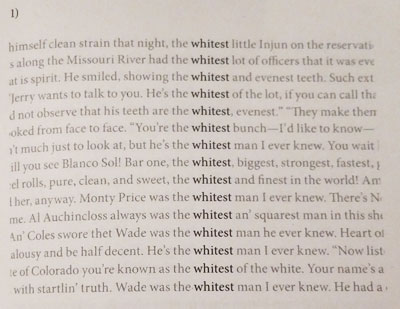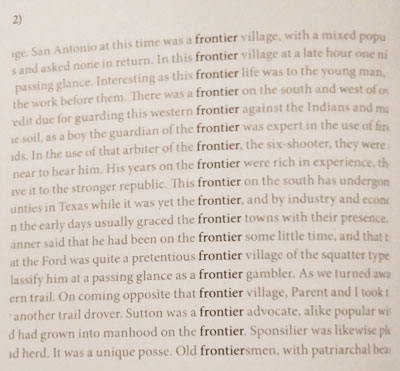he played injun in gods country
where boys proved themselves clean
dumb beasts who could cut fire
out of the whitest1 sand
he played english across the trail
where girls turned plum wild
garlic and strained words
through the window of night
he spoke through numb lips and
breathed frontier2


Notes on the Poem
Our Poem of the Week choices continue to focus on work from the 2017 Griffin Poetry Prize shortlist. This week's selection comes from Jordan Abel's Injun, whose determined and resourceful deployment of poetic technique inspired the 2017 judges to declare "What does it mean to arrange hate to look like verse? What becomes of the ugly and meaningless?" Abel employs methods in the practice of found poetry to achieve unique impact in Injun. As defined by in various poetry resources (including the American Academy of Poets):Found poems take existing texts and refashion them, reorder them, and present them as poems. The literary equivalent of a collage, found poetry is often made from newspaper articles, street signs, graffiti, speeches, letters, or even other poems.Abel's source was dozens of public domain western novels, published from 1840 to 1950. At the end of Injun, he reveals the process by which he built the work:Injun was constructed entirely from a source text comprised of 91 public domain western novels with a total length of just over ten thousands pages. Using CTRL+F, I searched the source text for the word "injun," a query that returned 509 results. After separating out each of the sentences that contained the word, I ended up with 26 print pages. I then cut up each page into a section of a long poem. Sometimes I would cut up a page into three- to five-word clusters. Sometimes I would cut up a page without looking. Sometimes I would rearrange the pieces until something sounded right. Sometimes I would just write down how the pieces fell together. Injun and the accompanying materials are the result of these methods.On the opening page of the collection, "he played injun in gods country" starts from a place of strange heedlessness that is almost but not quite innocence, as "boys" and "clean // dumb beasts" seem to connote. With the first end-noted word - "whitest" - Abel inserts found material into the poem like something invasive injected into a sterile petri dish. He swiftly places words from another era - actually, not that long ago - into a stark modern-day context. It is both fascinating and healthily unsettling to see Abel take a poetic form, take a contemporary approach to it (texts extracted from an electronic public domain source, concatenated into one file, dissected using search and replace), subvert the form and alchemize the content to which its applied into a potent new perspective. The unflinching result of that process demands readers' attention.
